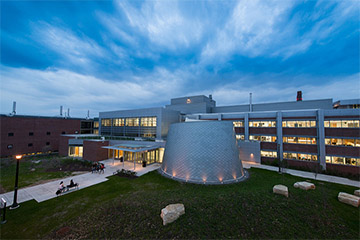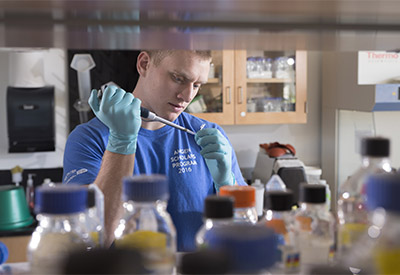
10/14/2016
SUNY Cortland biology major Timothy Duerr learned an important lesson during his ultra-competitive summer research internship at Massachusetts Institute of Technology (MIT).
“You don’t have to go to Harvard to do great things,” he said matter-of-factly.
Duerr would know.
More than 1,000 college students from across the country applied for the Amgen Scholars program hosted at MIT, and Duerr was one of only 20 selected for the two-month crash course in doctoral level science research. The senior from Massapequa, N.Y., whose undergraduate research at SUNY Cortland has focused on the evolutionary history of terrestrial flatworms, credited the quality of his training at the College.
“I knew the biology program was strong when I first visited Cortland,” Duerr said. “I just didn’t know how strong … especially after I understood the intelligence of my professors and saw how excited they were about teaching.”
Prospective students will have the opportunity to see it for themselves at SUNY Cortland’s Natural Sciences Department Showcase, which takes place Friday, Nov. 18. The daylong event offers a special campus visit experience for students interested in the College’s biology, chemistry, geology and physics departments.
 |
| Timothy Duerr, a senior biology major from Massapequa, N.Y., was one of 20 students from across the country selected to participate in a highly competitive summer research program hosted at Massachusetts Institute of Technology. More than 1,000 students applied. |
In addition to campus and department-specific tours, visiting students and their families can enjoy lunch and a demonstration in the College’s Planetarium. More importantly, they’ll hear from award-winning faculty members and inspiring students within each department.
Duerr said the relationships he developed with his professors, especially Biological Sciences Professor Peter Ducey, raised the level of his college experience. Ducey’s teaching inspired Duerr’s continuing research on terrestrial flatworms in the genus Bipalium. That work then led Duerr to the lab of Biological Sciences Professor Patricia Conklin to compare the lineage of the flatworms to others in the genus.
Duerr joked that most biology majors can’t recall faculty members’ office hours because they usually can be found any hour of the day in Bowers Hall, the College’s science hub that completed renovations in 2014.
“There’s an open invitation to pop in, say hi and tell them about your research or a class you’re taking,” he said. “They’re always genuinely interested and engaged.”
The same passion for science resides in students like Duerr, a member of the College’s Biology Club who hopes to help fellow students decipher complex research by creating the Current Research in Biology Club. The goal is to foster strong scientific analysis skills by discussing current literature in biology and bringing guest speakers to campus.
“I want to help develop those skills of reading and listening to science,” he said. “They’re fundamental for anyone considering graduate school, whether you’re pursuing an M.D. or Ph.D.”
Duerr said he arrived at SUNY Cortland with the hopes of becoming a physical therapist but soon realized that he enjoyed natural science more than healthcare. He flirted with the idea of becoming a high school science teacher before entertaining the idea of doctoral-level research. The recent summer experience at MIT confirmed his career goal in college-level teaching and research.
“A lot of the research that I do is science for the sake of science … really just elucidating the unknown,” he said. “We know a lot in science. That’s a fact. But there’s even more that we don’t know.”
Working alongside similarly bright young science scholars from across the country, Duerr knew he belonged in their company. He felt confident in the college he chose and thankful for the professors who helped get him there.
“Striving to learn more about the natural world is a goal worth pursuing,” he said. “Who knows what it can lead to?”